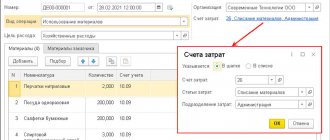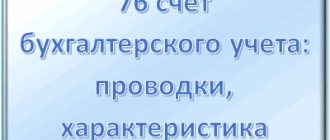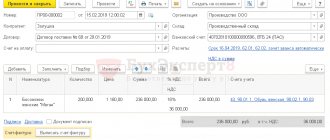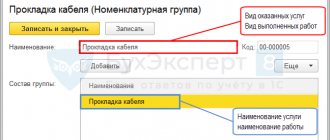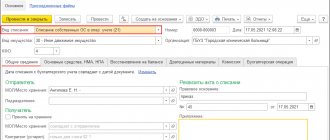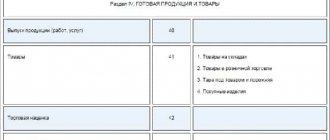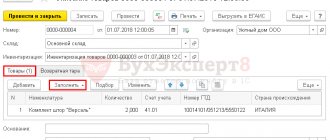In what cases may administrative sanctions be imposed on a company?
The Administrative Code contains dozens of articles, according to which a legal entity may be subject to penalties.
We list a number of the most common cases:
- In case of violation of traffic rules by drivers driving vehicles owned by the organization.
- In case of violations of labor legislation identified by Rostrud specialists.
- In case of violations of legislation on the protection of consumer rights by trade organizations.
- In case of violations of certain requirements of tax legislation that are not directly related to the payment of taxes (for example, deadlines for submitting declarations).
Administrative fine - accounting entries
The general principles for reflecting expenses in accounting are given in PBU 10/99 “Expenses of an organization.”
Because fines cannot be attributed to expenses directly related to the main activities of the company, they can be classified as other expenses in accordance with clause PBU 10/99. The list given in this paragraph is open, therefore, on its basis, penalties can also be recognized as expenses.
In accordance with the Chart of Accounts, approved by order of the Ministry of Finance of the Russian Federation dated October 31, 2000 No. 94n, account 91 is used to account for other expenses.
Thus, if the company is assessed fines, the accounting entries will be associated with this account. Regardless of the type of fine - traffic violation or labor inspection fine - the accounting entries will be the same:
DT 91.2 – CT 76 – charging a fine;
DT 76 – CT 51 – the fine is transferred to the budget.
If the company challenged the fines in court, but lost the case, the bailiffs can carry out the collection. In this case, the postings on the writ of execution will be similar to those discussed above.
Unlike accounting, tax accounting provisions contain a direct prohibition on including penalties transferred to the budget into expenses (clause 2 of Article 270 of the Tax Code of the Russian Federation).
In this case, there is a constant difference between the two types of accounting in the amount of accrued penalties.
Therefore, if an organization has accrued a fine, the entries must be supplemented with transactions to reflect tax differences in accordance with PBU 18/02. In this case, a permanent tax liability (PNO) arises. To determine its value, you need to multiply the permanent difference by the current income tax rate.
DT 99 – KT 68.4 – reflected PNO
Thus, if an organization has been assessed a fine, the entries relate not only to settlements with the budget, but also to the resulting tax differences.
When a fine paid for an employee becomes income
The organization paid a fine for the chief accountant and decided not to withhold this amount from the employee’s salary. In this case, are contributions to the Social Security Fund and Belgosstrakh, as well as income tax, calculated?
Based on the results of a random audit, the tax inspectorate issued a resolution on administrative liability under Part 3 of Art. 13.6 of the Code of Administrative Offenses in relation to an official of the organization - the chief accountant. The amount of the fine, taking into account mitigating circumstances under clause 3, part 1, art. 7.2 of the Code of Administrative Offenses amounted to 102 rubles. (4 BV x 25.5 rub.).
Within the prescribed period, the organization paid the fine from the current account and reflected it as part of other expenses for current activities that are not taken into account when taxing profits. According to the manager’s order, the amount of the fine is not withheld from the employee’s salary.
For the chief accountant, this is the main place of work. No other payments not related to the performance of job duties were made in favor of the employee.
General provisions
Based on the results of random audits, tax inspectorates, in the event of non-payment (incomplete payment) of taxes, make decisions to bring the organization's officials to administrative liability in the form of a fine <*>.
The amount of the fine imposed on the official depends on the type of guilt: intentional or careless. The amount is based on the percentage of additional taxes assessed during the audit for the period of the official’s work and the total amount of taxes calculated for the given period <*>.
When making decisions, mitigating and aggravating circumstances of administrative responsibility are taken into account <*>.
The amount of the fine presented is paid by the official himself or transferred for him by the organization. In the latter case, by decision of the employer, the amount paid for the employee may not be deducted from his salary. At the same time, it is considered as additional income of the employee with appropriate taxation <*>.
Accounting
In the situation under consideration, a fine was imposed on the chief accountant by a resolution of the Ministry of Taxation Inspectorate. The tax office reflects it in the organization’s personal account and an extract from the accounting data. And based on the extract, the organization reconciles the calculations with the budget. For the convenience of performing such a reconciliation, in our opinion, it is more appropriate to reflect the payment of the fine for the chief accountant in the debit of account 68 “Calculations for taxes and fees” with the credit of account 51 “Current account”. Since the amount of the fine is not deducted from the employee’s salary, it is taken into account as part of other expenses for current activities and is reflected in the debit of account 90 “Income and expenses for current activities” (subaccount 90-10 “Other expenses for current activities”) <*>.
Contributions to the Social Security Fund and Belgosstrakh (at the expense of the organization) are accrued on the debit of those accounts that reflect payments in favor of the employee. In this case, the accrual of contributions to the Social Security Fund and Belgosstrakh is reflected in the debit of account 90 “Income and expenses for current activities” (subaccount 90-10 “Other expenses for current activities”) in correspondence with the credit of accounts 69 “Calculations for social insurance and security”, 76 “Settlements with various debtors and creditors” (subaccount 76-2 “Settlements for property and personal insurance”) <*>.
Contributions to the Social Security Fund withheld from the employee from the amount of the fine paid by the employer are reflected in the debit of account 70 “Settlements with personnel for wages” and the credit of account 69 “Calculations for social insurance and security” <*>.
Contributions to the Social Security Fund and Belgosstrakh
All payments in favor of the employee, both in cash and in kind, are subject to contributions to the Social Security Fund and Belgosstrakh, with the exception of those named in List No. 115. Moreover, the total amount of payments to the employee per month should not exceed five times the average salary of workers in the republic for the month preceding the month for which the specified contributions are paid <*>.
In the situation under consideration, the payment by an organization of a fine for an employee will be a social payment for him, which is not indicated in List No. 115. Therefore, insurance contributions to the Social Security Fund and Belgosstrakh are charged on it <*>.
Income tax
As a general rule, income tax is withheld from all income received by an employee, both in kind and in cash. At the same time, income that is not remuneration for the performance of labor or other duties is exempt from income tax at the place of the employee’s main job in the amount of 1984 rubles. The amount of exemption is calculated on an accrual basis from the beginning of the year. An amount exceeding the specified limit is taxed in accordance with the general procedure <*>.
In this case, the employee at his main place of work receives income in the amount of the fine paid for him (102 rubles). But taking into account the fact that other payments not related to the performance of labor duties in favor of the employee did not exceed the amount established by law, this income is exempt from income tax <*>.
Income tax
The amount of the fine transferred to the budget for the employee is not taken into account when taxing profits as a social payment not provided for by law. At the same time, insurance premiums accrued for this amount to the Social Security Fund and Belgosstrakh are included in taxable profit as non-operating expenses <*>.
Accounting Entry Table
| Contents of operations | Debit | Credit | Amount, rub. | Primary document |
| The organization transferred a fine for the chief accountant | 68 | 51 | 102 | Payment order, bank account statement |
| The amount of the fine imposed on the chief accountant <1> is reflected | 90-10 | 68 | 102 | Resolution of the tax inspectorate, accounting certificate-calculation |
| Contributions to the Social Security Fund have been accrued (102 rubles x 34%) <2> | 90-10 | 69 | 34,68 | Accounting certificate-calculation |
| Contributions have been accrued in Belgosstrakh (the rate is conditional) (RUB 102 x 0.5%) <2> | 90-10 | 76-2 | 0,51 | Accounting certificate-calculation |
| Contributions to the Social Security Fund were withheld from the chief accountant (RUB 102 x 1%) | 70 | 69 | 1,02 | Payroll, accounting certificate, calculation |
| ——————————— <1> It is not taken into account when taxing profits as a social benefit not provided for by law <*>. <2> Taken into account when taxing profits as part of non-operating expenses <*>. | ||||
Compensation for traffic police fines at the expense of the guilty party
In accordance with Art. 238 of the Labor Code of the Russian Federation, the organization has the right to recover the paid fine from the guilty person. In this case, the driver may be found guilty.
If the organization that owns the vehicle was assessed a traffic police fine, the damage compensation transactions will be as follows:
DT 73 – CT 91.1 – the amount of the fine is allocated to settlements with the guilty person;
DT 70 – CT 73 – amount withheld from salary, or
DT 50 – CT 73 – the amount was voluntarily deposited into the cash desk of the enterprise.
Example
Driver Smirnov A.V. in a car owned by Alpha LLC, he exceeded the speed limit and was fined 1 thousand rubles. To reflect this fine for traffic violations in accounting, the accounting entries will be as follows:
DT 91.2 – CT 76 (1000 rub.) – fine charged
DT 76 – CT 51 (1000 rubles) – the amount of the fine is transferred to the budget
DT 99 – CT 68.4 (1000 x 20% = 200 rubles) – permanent tax liability reflected
DT 73 – CT 91.1 (1000 rubles) – the fine is assigned to the guilty person
DT 50 - CT 73 (1000 rubles) - the driver deposited the amount into the cash register.
Situation 2. Pay a fine
Postings:
The payment of the fine is reflected in the accounting entry D-t 76 K-t 51
We recognize the fine in other expenses as an accounting entry D-t 91 K-t 76
In tax accounting, this amount will not be taken into account when calculating income tax (clause 2 of article 270 of the Tax Code of the Russian Federation, part 5 of article 3.5 of the Code of Administrative Offenses of the Russian Federation).
Situation 2.1. Withhold a fine from an employee's salary
Withholding from an employee is possible as compensation for material damage caused to the organization under Art. 238 Labor Code of the Russian Federation. An organization, by paying a fine, spends funds belonging to it, and therefore incurs direct actual damage (Letter of Rostrud dated October 19, 2006 No. 1746-6-1, Letter of the Ministry of Finance dated August 22, 2014 No. 03-04-06/42105).
Here you should pay attention to Art. 239 of the Labor Code of the Russian Federation, which describes cases that exclude the liability of an employee.
If the decision to withhold is nevertheless made, then an order is necessary, and it is important not to forget that:
- The maximum amount of deduction per month is 20% of accrued wages (Article 138 of the Labor Code of the Russian Federation);
- The period for withholding, usually counted from the day the fine is paid, is 1 month (Article 248 of the Labor Code of the Russian Federation);
- The total amount of deduction is the employee’s average monthly earnings (Article 241 of the Labor Code of the Russian Federation).
Download a sample order to withhold a fine
All these limits do NOT apply only in cases of voluntary repayment by the employee. The employee’s voluntary expression of will is documented by a statement.
Download a sample application for voluntary deduction of a fine
Postings:
The deduction from the employee is reflected in the accounting entry D-t 70 K-t 73
The employee's recognition of material damage (fine) is reflected in D-t 73 K-t 91
Here we note that according to paragraph 3 of Article 250, paragraph 4 of paragraph 4 of Art. 271 of the Tax Code of the Russian Federation, this amount can be interpreted as non-operating income and subject to income tax. There is an opposite point of view that this amount is not an economic benefit and should not be included in the calculation of income tax. The choice, as always, remains with the taxpayer.
Situation 2.2. Do not withhold a fine from an employee
Regarding forgiveness of the fine, this situation is also possible, since holding an employee accountable is a right, not an obligation, of the employer. Here, both full and partial forgiveness of the fine amount is possible. According to the latest clarifications (letter of the Ministry of Finance of the Russian Federation No. 03-04-07/105532 dated December 2, 2020, letter of the Federal Tax Service No. ED-4-3/7135 dated April 18, 2013), the employee does not have natural income in this situation, accordingly there are no grounds for withholding personal income tax.
Attention should be paid to the change in the position of regulatory authorities on this issue. So earlier in 2012, the Federal Tax Service of the Russian Federation said that the obligation to withhold personal income tax still appears (letters No. 03-04-06/12341 dated April 12, 2013, No. 03-04-06/10-310 dated November 8. 2012)
IMPORTANT! The obligation to withhold personal income tax may arise in a situation where the car belongs to an employee and is used for business purposes. If the employer nevertheless decides to compensate such a fine, although he is not obliged to do so, then when paying compensation the employee will receive income in kind (Articles 41, 211, 223, 226 of the Tax Code of the Russian Federation, letter of the Ministry of Finance No. 03-04-05/ 28925 dated June 17, 2014). In addition, this amount must be subject to insurance premiums, since it is not included in the closed list of non-taxable payments (Articles 420, 422 of the Tax Code of the Russian Federation, Articles 20.1, 20.2 of Law No. 125-FZ of July 24, 1998)

